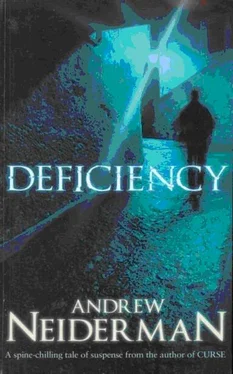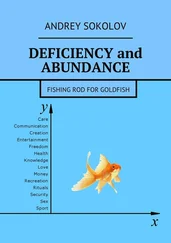Terri released a hot breath of relief.
"He's going," she told Darlene.
"Who is he?" she asked.
"A modern-day Frankenstein," Terri replied. "Let's get some help," she added and held up the cellular phone she had been grasping tightly during the whole flight. Before she could flip it open to punch out a 911 call, it rang. For a moment it was as if she was holding a hand grenade that had just been triggered. It was truly like a small explosion. She nearly dropped the phone. Then, she flipped it open and brought it to her ear slowly. She didn't say hello. She held it there.
"Garret?" she heard. "Doctor Stanley? Are you there?" That voice.
She couldn't mistake it.
It was Will Dennis.
"I now know how he knew you had spoken to Paula Gilbert," she muttered as she closed the phone.
"I don't understand," Darlene said.
Terri shook her head and looked at the cell phone. She truly felt as if the legs had been cut out from under her and sat back stunned.
She looked at the phone.
It had been a hand grenade after all.
Anxious and impatient, he decided to wait for the Samuelses in their room. Surprise was always his best friend in situations like this, he thought. There would be no need to manufacture some reason to be there. No reason to tax his brain. He found the master key for all the rooms and just sauntered down as if he was carrying out some mediocre, simple responsibility. When he entered the room, he saw they had left a lamp on next to the bed and a light on in the bathroom.
"Sure, what do you care about my electric expenses," he muttered. He liked playing a role, enjoyed slipping into identities, assuming someone else's life, even that ugly man decomposing in his living room. At least, he had a life of some sort.
When you're desperate for an identity, you take what you find, he told whatever part of him even suggested criticism. Survival takes precedent over everything and anything else. And what great difference did it make anyway? Very soon he would drop this identity and leave it behind like an old suit of clothes. In a sense he resembled a snake, shedding its skin. He didn't mind the analogy really. How clever it was to be able to take off your skin and replace it with a brand-new covering?
Curious about these people now, he passed the time by going through their bags. He held up Mrs. Samuels's undergarments, deciding she was quite conservative and obviously very wide in the hips. Charles Samuels had very uninteresting clothing, too. His suit and two sports jackets were bland, simple, and not very expensive.
He found some personal papers, business cards that told him Charles Samuels was a loan officer in a bank. There was a letter from some cousin in Kingston describing her new home and inviting the Samuelses to visit. The directions to the house were in the letter. He thought about it a moment and wondered if this was a sign. Should he be heading there? Nothing dramatic happened, no ringing in his head, but still, he thought he should give it consideration, so he folded it up and put it into his pants pocket.
It was time to plan. What would he do exactly when the Samuelses arrived? He had thought of something, he realized. Before he had ambled down here, he had made something of a plan. What was it? Damn this memory thing. He had to restore whatever it was in him that was bringing about these lapses. That was for sure.
He looked at the bed and saw the long, serrated bread knife he had brought along.
"Oh yeah," he said aloud. "The best way to say hello." Remembering restored his confidence in himself. He sat comfortably now and waited. They couldn't be much longer. People who didn't know an area wouldn't spend much time out there at night. They would find the restaurant they wanted, eat, and come right back. He checked his watch. It occurred to him that he wasn't sure exactly when they had left. Time was becoming very obscure again, liquefying and freezing into a piece of ice. He couldn't hold on to it at all. Had ten minutes passed or an hour? When did he walk in here? All these little confusions were mounting.
He felt a buzzing inside his head and soon he couldn't sit still. He rose and paced and went to the window to check the parking lot and then paced and began to talk to himself, reciting words, names, events in no special order or logic, babbling as if he was some sort of cauldron of memories, overflowing.
"I'm literally losing my mind!" he cried. "Damn you," he raged, waving his fist at the ceiling.
Who? He thought he heard called back.
Damn who?
He didn't know and it was stupid to behave like this anyway. He paused and then seized a grip on himself and sat again. When he looked at his watch, he thought only a minute or so had gone by. How could that be?
His lips were drying.
His eyes burned.
His very skin felt as if it were writhing on his bones and inside himself his organs were turning and twisting, tugging on his bones.
I am not a well man, he thought, and then he thought, I am not a man. What am I?
On his wrist, time, like a persistent termite, continued to bore a hole in his wooden heart.
Finally, he heard the distinct sound of a car entering the motel lot. Excited, he rose quickly and peered through the curtains. It was the Samuelses all right. About time. He backed up and pressed his back against the wall so when they entered, they would not see him there until they had closed the door behind them.
He heard the key being inserted and braced himself. The door opened, but only part way.
"All right," he heard Charles Samuels say in an irritated voice, "I'll just get everything myself. Stay in the car."
Stay in the car? That wouldn't work, he thought.
The door opened farther. Charles entered, but didn't look in his direction. Instead, Samuels started for the open suitcase.
He pushed the door so it shut and Samuels turned around.
"What?" he asked as if he had said something to him. Samuel's face collapsed in fear. "What is this?"
"You left the lights on," he said. "You went out to eat and you left the lights on."
"Huh?"
"That's inconsiderate," he told him stepping closer. Samuels had yet to see the knife he was holding just behind his back. "And when people are inconsiderate of others, they should be punished," he continued.
Samuels looked at the closed door, considered his options, and started to back away.
He smiled, raised his left hand abruptly, which caught Samuels's attention, and then drove the knife into and just to the left of Samuels's sternum. With the accuracy of a heart surgeon, he sliced the pulmonary artery. Samuels gasped, raised his hands as if to surrender, and then coughed, brought his hands down surprisingly hard onto his shoulders, and held himself there for a moment, gazing into his face, his own eyes full of wonder as though he had a preliminary view of where he was now going before collapsing at his feet.
"Turn off the lights when you leave next time," he muttered down at Samuels. All was quiet. He turned to the door and listened. Mrs. Samuels had not gotten out of the vehicle yet. He waited and suddenly, he heard the car horn. He went to the window and saw her leaning over to press it. She did it again and then, frustrated and angry, she opened the car door and came toward the unit. Once again, he backed away from the door. When she opened it, she was in midsentence.
"What's taking you so damn long, Charles? We've got to get out of here before..."
She stared at her husband's folded body on the floor. It took the breath out of her and all she could do was gasp and bring her hands to the base of her throat. Quietly, calmly, he closed the door behind her and she turned. He smiled.
"Now if you don't put up a struggle, you might live," he said. He knew there was no chance of that, but when someone was in a state of pure desperation, even empty promises bobbed about like lifesavers. He raised the bloodied knife so she would see it.
Читать дальше












